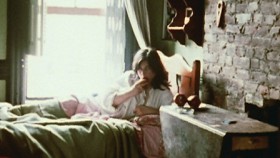Når jeg læser den velskrevne pressemeddelelse om de tre gæste-programredaktører knyttet til CHP:DOX 2015, Naomi Klein / Avi Lewis og Olafur Eliasson får jeg lyst til at sætte NB i margenen. Det har jeg gjort ud for vigtige og tankevækkende og smukke steder i tekster siden min geologi- og geografilærer Mogens Walther, som lærte mig så mange fundamentale ting om den konkrete verden, også lærte mig dette: det her er et sted, og så læste han op af lærebogen, hvor I skal sætte NB i margenen. Med blyant. I pressemeddelelsen fra CHP:DOX er der to sådanne steder, to afsnit, som får mig til først at nyde formuleringerne, dernæst forhåbentlig holde dem fast og finde ud af mere om problemstillingerne og om filmene som belyser dem, skildrer dem.
”POLITISK ENGAGEMENT OG FILMKUNSTNERISK ORIGINALITET
Den canadiske journalist og forfatter Naomi Klein er den væsentligste stemme i den handlingsorienterede, moderne klimaaktivisme. Klein slog igennem med bestselleren No Logo, der samlede miljø- og antiglobaliseringsbevægelsen i en international kritik af den neoliberale verdensorden. Og som slog fast, at aktivisme ikke (kun) handler om protest, men også om at angive konstruktive, praktiske og realiserbare løsningsforslag – og at leve efter dem. Hvilket skinner igennem i det kuraterede program af hende og filminstruktøren Avi Lewis.
Her finder vi 10 dokumentarer med bud på hvordan politisk engagement, filmkunstnerisk originalitet og stærke fortællinger kan gøre en forskel. Du kan opleve filmen Intet bliver som før, der er baseret på Kleins opsigtsvækkende bog This Changes Everything, der kontroversielt hævder at klimakrisen ikke blot er vor tids absolut mest presserende udfordring. Den er samtidig den største mulighed vi nogensinde har haft for at ændre verden.”
Programmet omfatter endvidere klassikere som Hour of the Furnaces og Harlan County USA og nye filmiske banebrydere som West of the Tracks og Leviathan. Desuden The Pearl Button og aktivistiske manifester som The Corporation og The Take.
”KLIMAET I DEN ANTROPOCÆNE TIDSALDER
Det kuraterede program af Olafur Eliasson er, i lighed med kernen i Eliassons egne værker, film der tager afsæt i den fysiske verden omkring os og menneskets sansning af samme. Programmet bevæger sig igennem naturen og ser på de enorme, menneskeskabte forandringer af både klimatisk og geologisk karakter, som har givet det relativt nye begreb, Det Antropocæne så markant en relevans i såvel samtidskunsten som filosofien og geovidenskaben.
Begrebet refererer til en tidsalder, hvor den traditionelle opfattelse af naturen er under afvikling. Den antropocæne tid refererer til en periode i Jordens historie, hvor mennesket påvirker omgivelserne i sådan en grad, at naturen ikke længere findes i ”naturlig” tilstand.
Det er denne nye tid, som filmene særligt bevæger sig igennem – det er film, der kalder på nærvær, sansning og engagement, men det er også film med et underliggende kritisk perspektiv på menneskets indflydelse på klodens landskaber, både de naturlige og kunstige. Filmene bevæger sig langt fra dogmatiske dagsordner, men tilbyder i stedet et frirum til refleksion og inspirerer til, at man som tilskuer træder i karakter og sætter sig selv i spil.” (Katrine Ravndal, CPH:DOX)
Programmet omfatter værker af Werner Herzog, Claire Denis, Zhao Liang, James Benning, Anouk de Clercq, Pierre Huyghe og Apichatpong Weerasethakul.
CPH:DOX 2015 / 5. – 15. november
Den fulde oversigt over programmerne Klein/Lewis og Eliasson har redigeret kan ses fra 16. oktober på www.cphdox.dk hvor også billetsalget starter.
The website includes an English version of the text about the guest curators:
POLITICAL COMMITMENT AND ARTISTIC ORIGINALITY
“The Canadian journalist and author Naomi Klein is a leading voice of modern action-oriented activism. Klein became known for her bestselling book No Logo that linked the environmental and anti-globalisation movements in a criticism of the neoliberal world order. She stated that activism is not (only) about protest, but also about providing constructive, practical and feasible solutions – and living by them. This sentiment shines through the programme curated by Naomi and the film director Avi Lewis.
The programme will consist of 10 documentaries with suggestions on how political commitment, artistic originality and strong narratives can make a difference. During the festival you will be able to experience the film This Changes Everything, based on Klein’s sensational book of the same name, which raises a controversial claim that the climate crisis is not only the most urgent challenge of our time, but also the biggest opportunity we ever have to change the world.
In the programme you will also find classics of documentary cinema such as Hour of the Furnaces and Harlan County USA and the cinematic and innovative West of the Tracks and Leviathan, the Berlinale winner The Pearl Button and activist manifestos The Corporation and The Take.
THE CLIMATE IN THE ANTHROPOCENE EPOCH
The programme curated by Olafur Eliasson, close to the core of Eliasson’s own work, consists of films that are based on the physical world around us and the human perception of it. The programme moves through nature and examines the important man-made changes of both climatic and geological character that have given the relatively novel concept of Anthropocene a marked relevance in contemporary art as well as philosophy and geoscience. The concept indicates an age where traditional views of nature are phasing out. The Anthropocene epoch refers to a period in the history of the Earth, when humans influence the environment to such an extent that nature is no longer in its “natural” state. It is this new era that the films explore in particularity – films that call for presence, sensory perception and commitment, but also films that underlie the critical perspective of the human influence on the planet’s landscapes, both natural and artificial. The films are moving far from dogmatic agendas, but instead offering a space for reflection and inspiration to man whom as the spectator gets into character and joins the game.
The programme is rich in visionary and innovative works by artists and filmmakers such as Werner Herzog, Claire Denis, Zhao Lang, James Benning, Anouk de Clercq, Pierre Huyghe and Apichatpong Weerasethakul.” (Katrine Ravndal)
http://cphdox.dk/en



